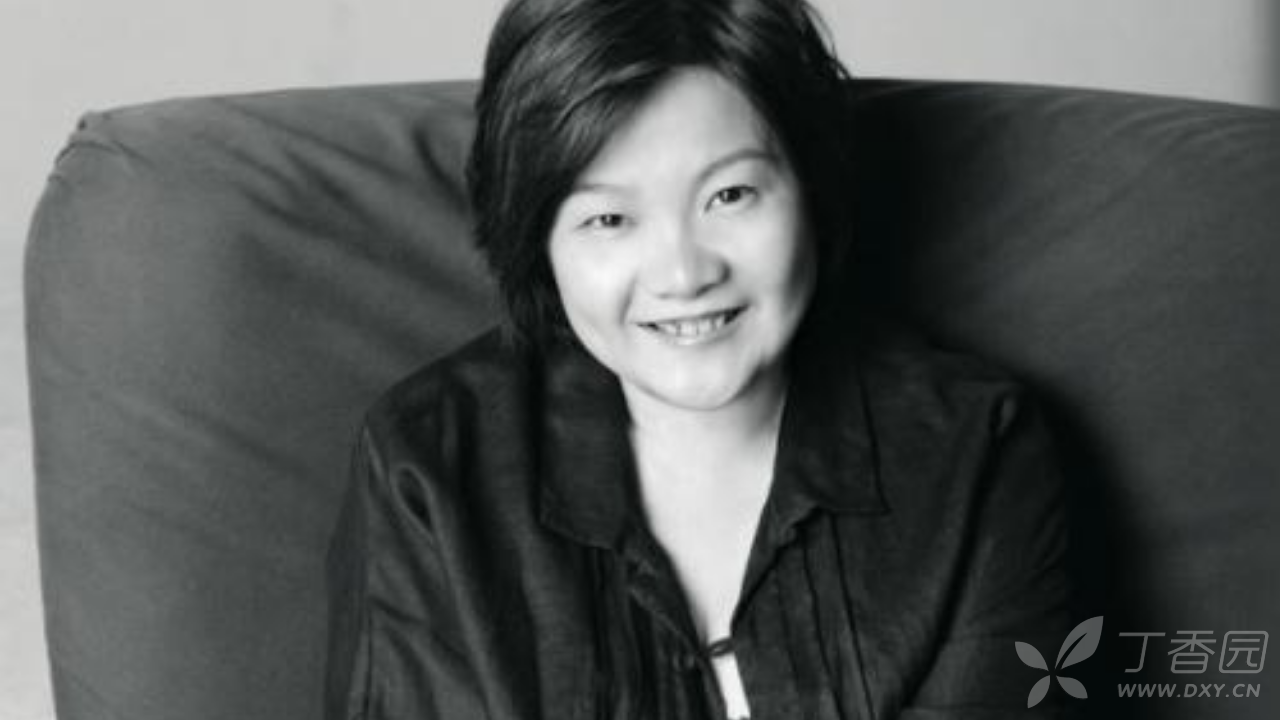TED: “名门痞女”洪晃


Helen Walters: Huang, it's so good to see you.
海伦•沃尔特斯:洪晃,见到你真不错。
Thank you for joining us.
感谢您加入我们。
How's your 2020 been?
你的2020年怎么样?
Huang Hung: My 2020 started totally normal.
洪晃:我的2020年开始完全正常了。
In January, I went to Paris, did my interview for the fashion week there, came back to Beijing on January 22nd, and finding things a little bit tense because there were a lot of rumors.
一月份,我去了巴黎,在那里参加了时装周的面试,1月22日回到北京,发现事情有点紧张,因为有很多传言。
Having lived through SARS, I wasn't that concerned.
经历过非典,我没那么担心。
And on the 23rd, I had a friend of mine from New York come to my house who had a flu, and we had dinner together, and another friend who came, who left the next day for Australia for vacation on an airplane.
在23号,我有一个来自纽约的朋友来我家,他得了流感,我们一起吃饭,还有一个朋友来了,第二天离开去澳大利亚去度假的飞机上。
So we were not taking this terribly seriously until there was a lockdown.
因此,在锁定之前,我们并没有非常严肃地对待这件事。
HW: And we've seen that echo around the world.
HW:我们己经看到了全世界的回声。
I think still some people find it hard to understand the magnitude of some of the measures that China took.
我认为,仍然有些人很难理解中国釆取的一些措施的严重性。
I mean--what else are we missing about China's response in all of this?
我是说,在这一切中,我们还有什么没有对中国的反应呢?
HH: You know, historically, we're just two very different countries in terms of culture and history.
HH:你知道,从历史上看,就文化和历史而言,我们只是两个截然不同的国家。
I mean, these are two completely different human experiences for its people.
我的意思是,这是两个完全不同的人类经验,为它的人民。
So, for China, when the lockdown happens, people are OK. People are OK with it, because they think that's what a good parent should do.
所以,对于中国来说,当封锁发生时,人们就没事了。人们对此很好,因为他们认为那是一个好父母应该做的。
You know, if a kid gets sick, you put him in the other room, and you lock him up and make sure that the other kids don't get sick.
你知道,如果一个孩子生病,你把他放在另一个房间,你把他关起来,确保其他孩子不生病。
And they expect that out of the government.
他们期望government会这样做。
But when it is outside of China, from America, it becomes a huge issue of the right political thing to do and whether it's infringing on personal freedom.
但是当它在中国之外,从美国,它成为一个巨大的问题,正确的政治事情做,它是否侵犯个人自由。
So the issues that you have to deal with in a democratic society are issues that one does not have to deal with in China.
因此,在**社会里,你必须处理的问题,在中国是不必处理的问题。
I have to say that there's a word in Chinese that doesn't exist in any other language, and the word is called "guāi." It is what you call a kid who listens to his or her parents.
我不得不说,汉语中有一个在任何其他语言中不存在的词,这个词叫做"guāi”你所说的孩子听父母的话。
So I think, as a people, we are very "guāi”We have this sort of authoritarian figure that Chinese always look up to, and they do expect the government to actually take the actions, and they will deal with it.
因此,我认为,作为一个人民,我们是非常"guāi”我们有中国人一直仰望的威权人物,他们确实希望government能真正采取行动,他们会处理它。
However much suffering there is, they feel that, OK, if big brother says that this has to be done, then it must be done.
不管痛苦有多大,他们觉得,好吧,如果大哥说这必须做,那么必须这样做。
And that really defines China as a separate mentality, Chinese has a separate mentality, as, say, people in Europe and America.
这真的把中国定义为一种独立的心态,中国人有一种独立的心态,就像,比如说,欧美人。
HW: That sense of collective responsibility sometimes feels a little absent from this culture.
HW:这种集体责任感有时在这种文化中感觉有点缺失。
At the same time, there are, I think, valid concerns around surveillance and data privacy, things like that.
同时,我认为,在监视和数据隐私方面存在合理的顾虑,诸如如此的事情。
What is the balance here, and what is the right trade-off between surveillance and freedom?
这里的平衡是什么,监视和自由之间的正确权衡是什么?
HH: I think in the internet age, it is somewhere between China and the US. I think when you take individual freedom versus collective safety, there has to be a balance somewhere there.
HH:我认为在互联网时代,它介于中国和美国之间。我认为,当你把个人自由与集体安全取而代之时,必须在那里的某个地方取得平衡。
With surveillance, the head of Baidu, Robin Li, once said the Chinese people are quite willing to give up certain individual rights in exchange for convenience.
在监视下,百度的负责人李彦宏,曾经说过,中国人民非常愿意放弃某些个人权利,以换取便利。
Actually, he was completely criticized on Chinese social media, but I think he is right.
事实上,他在中国社交媒体上受到了完全的批评,但我认为他是对的。
Chinese people are willing to give up certain rights.
中国人民愿意放弃某些权利。
For example,we have...
例如,我们有...
Chinese mostly are very proud of the payment system we have, which is you can go anywhere just with your iPhone and pay for everything, and all they do is face-scan.
中国人大多对我们拥有的支付系统感到非常自豪,这是你可以去任何地方,只是你的iPhone和支付一切,他们所做的只是面部扫描。
I think that probably freaks Americans out.
我想那可能吓到美国人了。
You know, China right now, we're still under semi-lockdown, so if you go anywhere, there's an app where you scan and you input your mobile phone number, and the app will tell the guard at the entrance of the mall, for example, where you have been for the past 14 days.
你知道,中国现在,我们仍然处于半封闭之中,所以如果你去任何地方,有一个应用程序,你扫描,你输入你的手机号码,应用程序会告诉守卫在商场的入口处,例如,你过去14天去过的地方。
Now, when I told that to an American, she was horrified, and she thought it was such an invasion of privacy.
现在,当我告诉一个美国人,她吓坏了,她认为这是对隐私的侵犯。
On the other hand, as someone who is Chinese and has lived in China for the past 20 years, although I understand that American mentality, I still find I'm Chinese enough to think,"I don't mind this, and I am better, I feel safer entering the mall because everybody has been scanned, whereas, I think individual freedom as an abstract concept in a pandemic like this is actually really meaningless.
另一方面,作为一个中国人,过去20年一直住在中国的人,虽然我理解美国人的心态,但我仍然觉得我是中国人,足以思考,”我不介意,我好多了,我觉得进入商场更安全,因为每个人都被扫描过,"而,我认为,在这样的大流行中,个人自由作为一个抽象的概念实际上是毫无意义的。
So I think the West really needs to move a step towards the East and to think about the collective as a whole rather than only think about oneself as an individual.
因此,我认为西方确实需要向东方迈出一步,把集体当作一个整体来思考,而不是仅仅把自己当作一个人来思考。
HW: The rise of antagonistic rhetoric between the US and China is obviously troubling, and the thing is, the countries are interlinked whether people understand global supply chains or not.
HW:美中之间敌对言论的兴起显然令人不安,问题是,无论人们是否了解全球供应链,国家都是相互关联的。
Where do you think we head next?
你认为我们下一步要去哪里?
HH: You know, this is the most horrifying thing that came out of this, the kind of nationalistic sentiments on both sides in this pandemic.
HH:你知道,这是最可怕的事情,从这出来,在这次大流行中,双方都有民族主义情绪。
Because I'm an optimist, I think what will come out of this is that both sides will realize that this is a fight that the entire human race has to do together and not apart.
因为我是一个乐观主义者,我认为,从中可以得出的是,双方将认识到,这是一场整个人类必须共同完成而不是分开的战斗。
Despite the rhetoric, the global economy has grown to such an integration that decoupling will be extremely costly and painful for both the United States and China.
尽管言辞激烈,全球经济已经发展到这样一体化,脱钩对美国和中国来说都是极其昂贵和痛苦。
HW: It's also been interesting to me to see the criticism that China has received quite vocally.
HW:看到中国受到相当公开的批评,我也很有趣。
For instance,they' ve been criticized for downplaying the death toll, arguably, also for trying to demonize Dr.Li, the Wuhan doctor who first raised the alarm about the coronavirus.
例如,他们被批评为淡化死亡人数,可以说,也因为试图妖魔化李医生,武汉医生谁首先提出了关于冠状病毒的警报。
I just saw a report in "The New York Times" that Weibo users have been posting repeatedly on the last post of Dr.Li and using this as kind of a living memorial to him, chatting to him.
我刚刚在《纽约时报》上看到一篇报道,微博用户在李博士的最后一篇文章中反复发帖,用这个作为他活生生的纪念,和他聊天。
There's something like 870,000 comments and growing on that last post.
有大约870000条评论,并增长在最后一篇文章。
Do you see a change in the media?
你看到媒体的变化了吗?
Do you see a change in the approach to Chinese leadership that actually could lead to China swinging perhaps more to the center, just as perhaps America needs to swing more towards a Chinese model?
你是否认为中国领导层的态度发生了变化,这实际上可能导致中国更多地转向中心,就像美国或许需要更多地转向中国模式一样?
HH: Unfortunately, not really, because I think there is a way between authoritarian governments and its people to communicate.
HH:不幸的是,不是真的,因为我认为威权government和人民之间有一种沟通的方式。
The night that Dr.Li died, when it was announced that he died, the Chinese social media just blew up.
李医生去世的那天晚上,当宣布他去世时,中国社交媒体刚刚爆炸了。
Even though he was unjustly treated as a whistleblower, he still went to work in the hospital and tried to save lives as a doctor, and then he died because he contracted the disease.
即使他被不公正地当作告密者对待,他仍然去医院工作,并试图挽救生命作为一个医生,然后他死了,因为他感染了疾病。
So there was anger, frustration,and all of that came out in kind of commemorating a figure that they feel that the government had wronged.
所以有愤怒,沮丧,所有这一切出来是一种纪念的数字,他们觉得government委屈。
The verdict and sort of the official voice on: 'Who is Dr.Li?
判决书和官方的声音是:"李博士是谁?
Is he a good guy or a bad guy? completely changed 180 degrees.
他是好人还是坏人?完全改变了180度。
He went from a doctor who misbehaved to the hero who warned the people.他从一个行为不端的医生,到警告人民的英雄。
So under authoritarian government,they still are very aware of public opinion, but, on the other hand,when people complain and when they commemorate Dr.Li, do they really want to change the system?
因此,在威权government下,他们仍然非常了解公众舆论,但是,另一方面,当人们抱怨,当他们纪念李博士,他们真的想改变系统吗?
And my answer is no, because they don't like that particular decision, but they don't want to change the system.
我的回答是否定,因为他们不喜欢那个决定,但他们不想改变系统。
And one of the reasons is because they have never, ever known another system.
原因之一是因为他们从来没有,从来没有,从来没有知道另一个系统。
This is the system they know how to work.
这就是他们知道如何工作的系统。
HW:What is wok-throwing, Huang?
HW:什么是甩锅,洪晃?
HH: Oh, wok-throwing is when you blame somebody else.
呵呵:哦,甩锅是当你责怪别人的时候。
Basically, someone who is responsible in a slang Chinese is someone who carries a black wok.
基本上,一个在俚语中负责的人是拿着黑锅的人。
You are made to be the scapegoat for something that is bad.
你被迫成为坏事的替罪羊。
So basically, Trump started calling it the "Chinese virus"“the'Wuhan virus," and trying to blame the entire coronavirus pandemic on the Chinese.
所以基本上,Trump开始称它为"中国病毒〃,”****”并试图把整个冠状病毒大流行归咎于中国人。
And then the Chinese, I think, threw the work back at the Americans.
然后中国人,我想,把锅扔回美国人。
So it was a very funny joke on Chinese social media, that wok-throwing.
所以在中国的社交媒体上,甩锅是一个非常有趣的笑话
There's a wok-throwing gymnastics aerobics exercise video that went viral.
有一个甩锅的体操健美操运动视频,病毒。
HW: But tell us, Huang: You're also doing dances on TikTok,right?
HW:但是告诉我们,洪晃:你也在TikTok上跳舞,对吗?
HH: Oh,of course.
HH:哦,当然。
I'm doing a lot of wok-throwing aerobics on TikTok.
我在TikTok上做很多扔锅的健美操。
HW: I mean, a potential silver lining of all of this is that it has laid bare some of the inequities, inequalities in the system, some of the broken structures that we have,and if we're smart, we can rebuild better.
HW:我是说,这一切的潜在一线希望是,它暴露了一些不平等,制度中的不平等,一些破碎的结构,我们有,如果我们聪明,我们可以重建得更好。
HH: Yes.
HH:是的。
I think one of the silver linings of this pandemic is that we do realize that the human race has to do something together rather than to be distinguished by our race, by the color of our skin or by our nationality; that this virus obviously is not discriminating against anyone, whether you are rich or poor, important or not important or whatever skin color or nationality you are.
我认为,这一流行病的一个好消息是,我们确实意识到,人类必须共同做某事,而不是被我们的种族、肤色或国籍所区分;这种病毒显然不是歧视任何人,不管你是富人还是穷人,重要或不重要或任何肤色或国籍。
So it is a time to be together,rather than to try to pull the world apart and crawl back to our own nationalistic shells.
所以现在是在一起的时候,而不是试图拉开世界,爬回我们自己的民族主义的外壳。
HW: It's a beautiful sentiment.
HW:这是一种美丽的情感。
Huang Hung, thank you so much for joining us from Beying.
洪晃,非常感谢您从北京来参加我们的节目。
Stay well, please.
请保持良好状态。
HH: Thank you, Helen, and you stay well as well.
谢谢你,海伦, 你也是。
最后编辑于 2022-10-09 · 浏览 8.5 万
















































